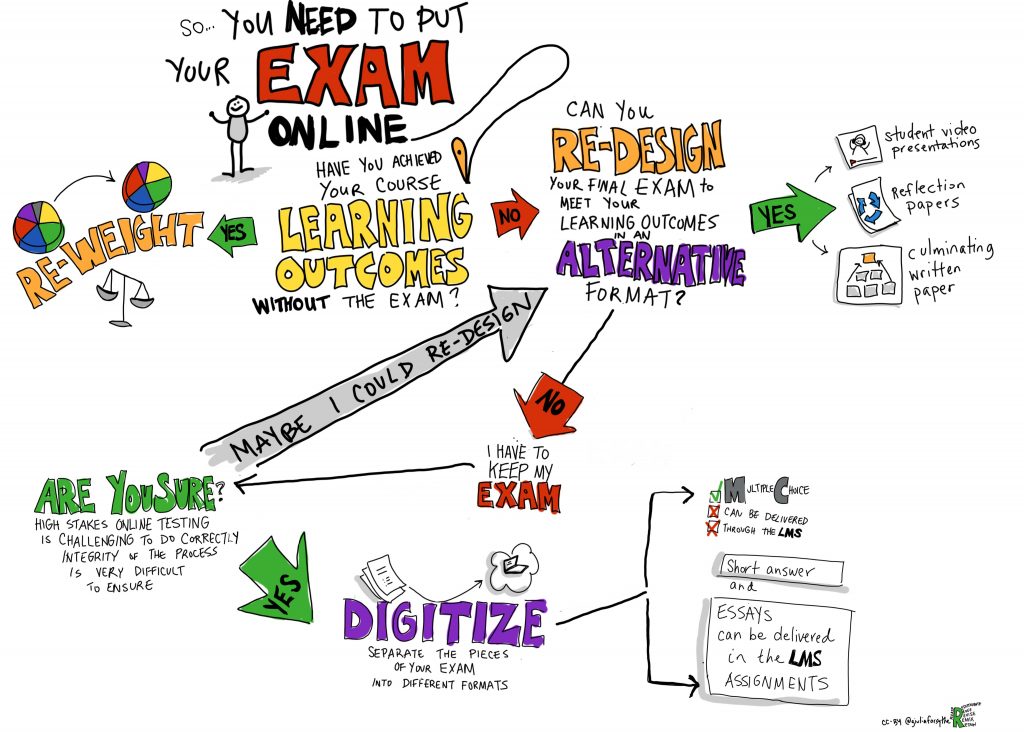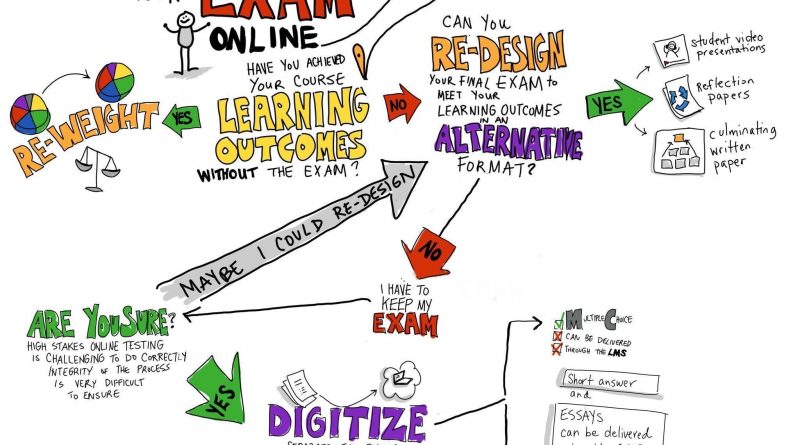Adapting Exams to Teaching Remotely
by Carie Cardamone, Associate Director Tufts Center for the Enhancement of Learning

As we quickly adapt our courses to teach remotely, faculty are wrestling with the question of how to adapt their planned assessments of student learning. Online exams raise concerns about academic integrity as the students are no longer in a controlled face-to-face environment with the instructor. Proctoring is more complex, and it is difficult to verify students’ lack of access to outside materials and the authorship of the work submitted. What can faculty do to mitigate these concerns? When remote proctoring is limited, how might you modify exams to maintain course rigor?
Create an Environment to Encourage Academic Honesty
Design your remote courses to encourage feelings of membership in a community and a shared sense of responsibility for learning and academic integrity. Some of the following techniques may help encourage honest engagement with your remote exams.
- Communicate Expectations of Academic Honesty: Clearly communicate with your students the importance of academic honesty and how a student can meet your expectations. For example, consider reminding students of your specific course policies before taking an assessment and submitting a statement of academic honesty with their work.
- Frequent Quizzing: Frequent, low-stakes assessments improve learning by providing regular opportunities for students to recall and apply knowledge and by providing instructor feedback on student performance. They also mitigate anxiety and performance pressure that students feel when confronting one ‘high-stakes’ exam.
- Pair or Group Exams: Working with peers motivates students to think and work collaboratively instead of competitively.
- Open-book exams: Because they allow for the use of notes, text or other resources, open-book exams typically challenge students to find and apply information in more complex ways. (ASU’s Toolkit: Writing Open Book Exam Questions)
- Verbal Exams: In small classes, you can set up individual online video meetings with students and ask them to respond to questions in the moment. This option enables you to give immediate feedback to students, which often enhances their learning.
- Student Choice: Giving students options about which questions they’d like to answer or how they can demonstrate their learning can provide them with additional ownership over their performance.
- Paper Exams: Students can view, download or print PDF-formatted exams and upload their hand-written solutions as images or scanned files. This can be useful in disciplines where you want to focus on student approaches to solving problems and give partial credit for, say, demonstrating thinking process in mathematical strategies.
- Synchronous Exams: Having students take the exam at a given time as a class can create a sense of shared experience. You can introduce the exam over a synchronous video session, and then provide students with a separate window interface in which they can access the exam and submit their answers. Asking students to keep their cameras on throughout the exam will further imitate an in-person experience. However, in larger classes there may be band-width issues in showing many video feeds.
- Time Limits: Setting an assignment to open and close within a limited timeframe can encourage students to prepare ahead of time and prevent over-reliance on external resources, simulating a closed-book format. However you set up these limits, students may have accommodations such as extra time, which need to be accounted for.
- Randomizing Questions: Techniques such as randomizing or shuffling questions that each student will see, or providing different answer options (for multiple choice questions) can discourage collaboration between students.
- Use standards-based grading: Rather than curving grades for online assessments, consider setting exam grades on an absolute scale. Then remember to communicate to students that their grade will not be influenced by the performance of their peers. See Seven Reasons for Standards-Based Grading from Educational Leadership.
Design Exams to Target Deeper Levels of Learning
Regardless of the format you decide up, an important technique is to pose provocative questions whose answers can’t be quickly found online or in a textbook. Such questions require students to think more deeply than they usually do when taking exams, for instance by motivating them to integrate what they learn across the course. This exam technique can enable you to see how students are processing their learning. The complexity of such questions can also encourage academic honesty. Bloom’s taxonomy can be a useful reference as you structure questions that inspire higher-order thinking.
Paul Hanstedt suggests “wicked problems” as a technique to engage students in deeper applications of their knowledge relevant to life-long learning. These problems include dynamics that are constantly changing, are resistant to obvious solutions, and can conclude incomplete or contradictory data. Some examples from his work include:
- What did you learn in this class that matters? (50% of take-home exam)
- Literature: Here’s a poem you’ve never seen before. Analyzing both style and content, make an argument for the poet who most likely authored this work.
- Seminar on Art and Community Murals: Create a proposal for a local public mural in the Dover area for possible grant/funding applications. Include and prepare a rationale for a description of the project, the long-term goals for community impact, several means of creating community input and involvement, and a budget.
- Biological Physiology: Argue for or against the feasibility of a Pegasus, drawing on our work this semester.
- Evolutionary Psychology: Imagine social media stays exactly the way it is now for the next fifty years. Based upon our work this semester, how might our brains evolve? Cognitively? Neurologically?
References
- Cluskey Jr, G. R., Ehlen, C. R., & Raiborn, M. H. (2011). Thwarting online exam cheating without proctor supervision. Journal of Academic and Business Ethics, 4(1).
- Dobson, John L. “The Use of Formative Online Quizzes to Enhance Class Preparation and Scores on Summative Exams.” Advances in Physiology Education 32, no. 4 (December 1, 2008): 297–302. https://doi.org/10.1152/advan.90162.2008.
- Hanstedt, P. (2018). Creating wicked students: Designing courses for a complex world. Stylus Publishing, LLC.
- Hollister, Kimberly K., and Mark L. Berenson. “Proctored Versus Unproctored Online Exams: Studying the Impact of Exam Environment on Student Performance.” Decision Sciences Journal of Innovative Education 7, no. 1 (2009): 271–94. https://doi.org/10.1111/j.1540-4609.2008.00220.x.
- Gikandi, J. W., D. Morrow, and N. E. Davis. “Online Formative Assessment in Higher Education: A Review of the Literature.” Computers & Education 57, no. 4 (December 1, 2011): 2333–51. https://doi.org/10.1016/j.compedu.2011.06.004
- Wigfield, Allan, and Jacquelynne S. Eccles. “Expectancy–Value Theory of Achievement Motivation.” Contemporary Educational Psychology 25, no. 1 (January 1, 2000): 68–81. https://doi.org/10.1006/ceps.1999.1015.
See Also




